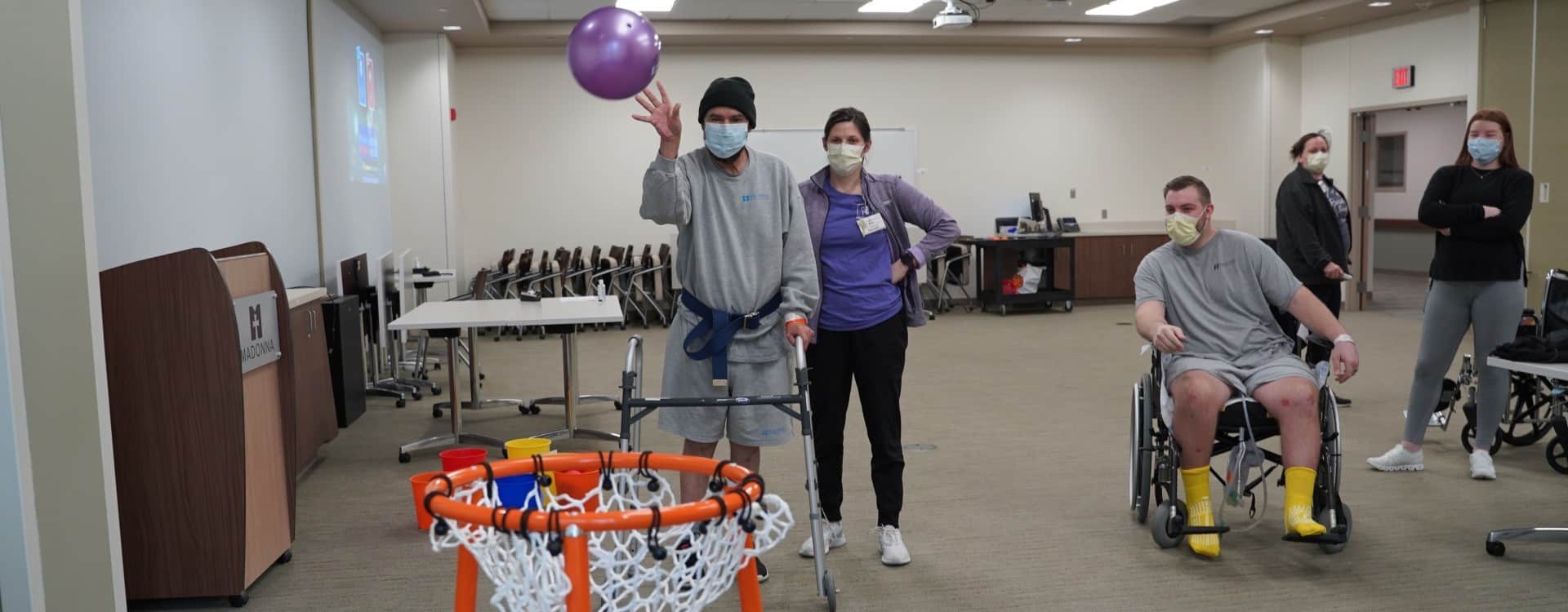CANCERCancer Rehabilitation
Emphasizing preventive measures and therapeutic strategies to empower each individual

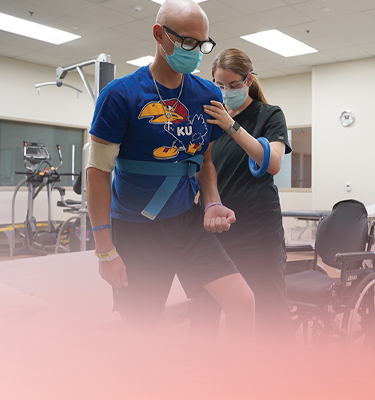
0
0
0
0
Cancer Rehabilitation Program Overview
Our comprehensive program caters to various clinical issues associated with cancer and its treatments. Whether you require inpatient or outpatient care, we specialize in managing pain, addressing mobility challenges, combating fatigue, assisting with daily self-care activities, overcoming communication obstacles and managing cognitive or emotional changes.
Program Details
Medical Care
Medical teams led by physiatrists, or physicians who specialize in rehabilitation, determine a customized plan for each cancer patient, designed to maximize their independence and help them return to the things that matter most to them whenever possible. Additional medical professionals with specializations such as pulmonology, neurology and neuropsychology may be consulted when appropriate.
Therapy
Madonna therapists work alongside physicians to help patients regain skills that may have been impaired by cancer treatment. Physical and occupational therapists utilize specially designed spaces to simulate life at home and in the community as well as provide variety and keep patients engaged. Family members are encouraged to participate in therapy sessions whenever possible. Our language and cognition lab allows patients to work outside of formal speech therapy sessions.
24-hour Nursing Care
Registered nurses with rehabilitation training and experience are on staff at all times to care for patients. Madonna’s nursing model supports a 24/7 rehabilitation approach allowing patients additional opportunities to practice daily skills learned and supported by therapy throughout their rehabilitation stay, even outside of scheduled therapy sessions.
Levels of Care
Madonna provides a comprehensive continuum of care for our cancer patients, regardless of severity.
Madonna is unique in that we offer two hospital levels of care on both our Omaha and Lincoln campuses. Our specialty hospitals (commonly known as LTACH, or long term acute care) are overseen by internal medicine hospitalists, providing complex medical care for patients with a broad range of needs. Our approach to complex medical care enables patients to participate in rehabilitation from their first days at Madonna. The therapy process is customized to each cancer patient based on their diagnosis and abilities, but the goal at this level is to help the patient tolerate increased activity while building up their endurance and strength to either return home or move to the acute rehabilitation level of care.
Our acute rehabilitation level of care delivers an intense program by providing three or more hours of therapy per day. By focusing on community reintegration and getting patients ready to resume their life activities, the goal at the acute care level is to resume the highest level of independence possible. Having both levels of care on the same campus minimizes the need for transfer, provides continuity and enables collaboration among clinical teams.
Our Rehabilitation Day Program (RDP) may be appropriate at the next stage. Patients return to our campus 2-5 times per week for several daily hours of therapy, split among multiple disciplines of occupational, speech and physical therapy. RDP allows for community reintegration while still benefiting from a rigorous therapy schedule.
Outpatient therapy is offered through Madonna’s Outpatient clinics. Frequency of therapy is unique to each patient. Outpatient therapy can include one or more discipline and vary in frequency depending on patient needs.
24-hour Respiratory Care
Madonna staffs licensed respiratory care practitioners at all times. Our respiratory therapists are able to provide arterial blood gas (ABG) services, ventilator management and weaning as well as tracheostomy management and weaning. Madonna is recognized as a Center of Excellence for Vapotherm and the Passy-Muir valve, specialized technology utilized for patients with tracheostomy tubes.
Community Integration
Rehabilitation after cancer is not just about regaining basic skills of self-care and mobility. The ability to resume one’s life role and reintegrate back into the community is an important component. Madonna integrates a variety of community re-entry, recreational, leisure and adaptive sports and recreation opportunities into the rehabilitation process. Therapy may include off-site visits to locations that may be challenging for cancer patients. Patients may also work on specific goals related to returning to work, school or driving during their rehabilitation stay.
PATIENT SUCCESS STORIES
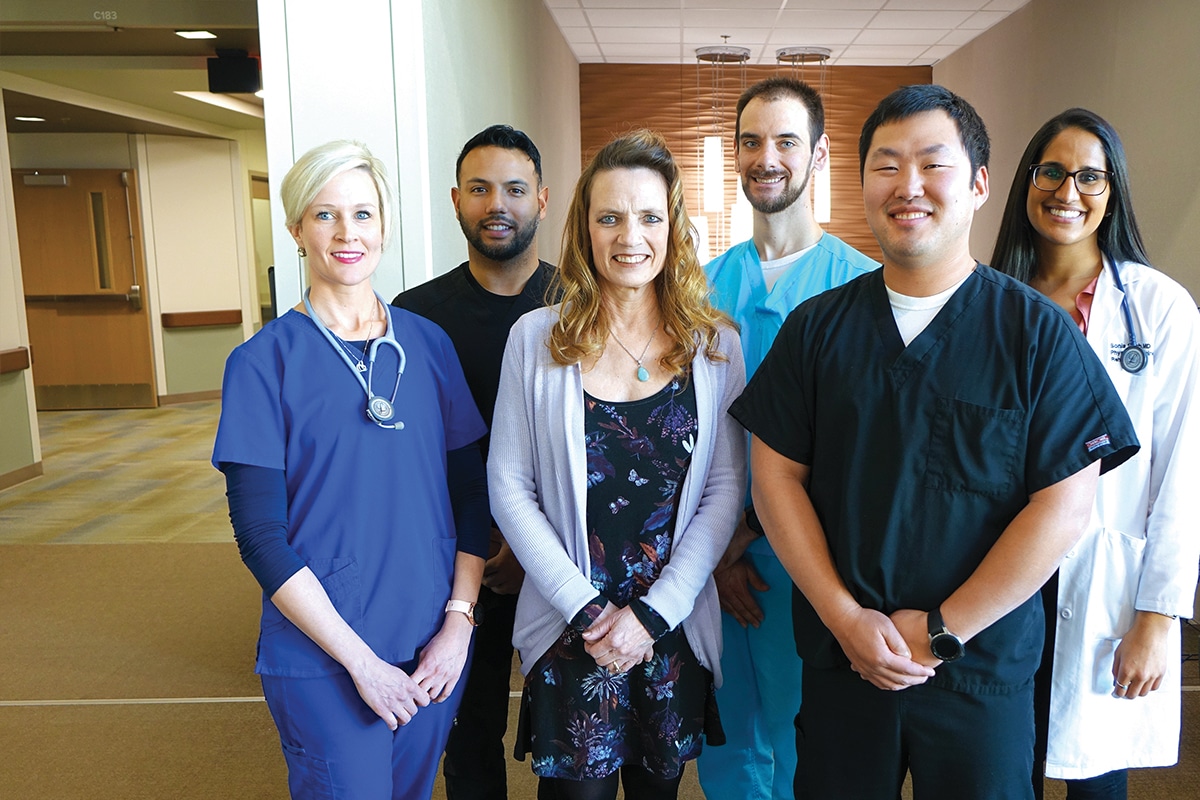
Interdisciplinary Team
Madonna’s care team of highly trained experts across specialties offers the best experiences and outcomes for cancer survivors and their families. This physician-led team includes skilled physical therapists, occupational therapists, speech-language pathologists, respiratory therapists, rehabilitation nurses, neuropsychologists, and certified teachers, just to name a few.
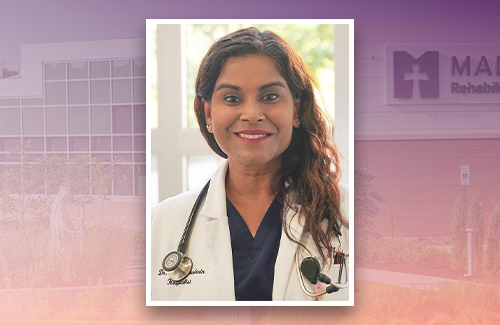
Overseen by a Board-Certified Physician in Internal Medicine
Dr. Ruthri Goodwin, MD, earned her medical degree from the UNMC College of Medicine in Omaha, Nebraska. She is board-certified in internal medicine. Before joining Madonna, Dr. Goodwin served in hospitalist roles at OrthoNebraska, CHI Lakeside, CHI Health Creighton Medical Center- Bergan Mercy, and the Omaha VA. She also holds a faculty appointment as an associate professor of medicine at UNMC.
Awards & accreditations
Madonna has received the highest possible level of accreditation from the Commission on Accreditation of Rehabilitation Facilities (CARF) across numerous inpatient/outpatient categories.
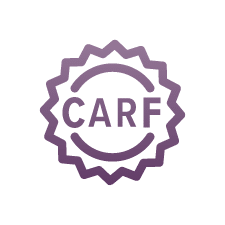
CARF Accreditation
Madonna has received the highest possible level of accreditation from the Commission on Accreditation of Rehabilitation Facilities (CARF) across 14 inpatient/outpatient categories. This year, Madonna celebrates 45 years of continuous CARF accreditation.

Cancer Specialty Program CARF Accreditation
Madonna has received the highest possible level of accreditation from the Commission on Accreditation of Rehabilitation Facilities (CARF) for its cancer inpatient specialty program for adults on the Omaha campus.
ADDITIONAL Information
Patient Financial Services
From understanding billing and insurance to exploring payment options and financial assistance, we ensure you have the necessary resources and guidance.
Family Housing
We provide comfortable and convenient housing options so you can stay connected and supportive throughout your loved one’s recovery journey. Explore our amenities today.
Support Groups
You don’t have to go through the rehabilitation journey alone. We offer a variety of support groups, with virtual and in-person options available.
- Cancer Education and Survivorship Group
- Second Thursday of every month 3:00 p.m. – 4:00 p.m.
- Contact Alex Eilers at [email protected] for location or Zoom information.
Scope of Services
Madonna Rehabilitation Hospital offers comprehensive programming for individuals of any age with all types of cancers from recent diagnosis or receiving concurrent cancer treatment throughout the survivorship spectrum. Madonna’s multiple levels of inpatient care, as well as outpatient services, ensure we can offer each patient with cancer the right type of care at the right time.
Madonna’s cancer program served 277 patients across inpatient and outpatient levels of care at both campuses in FY 2023. Approximately 39% of patients’ permanent residences were outside the Lincoln and Omaha metro.
Scope of services
Madonna’s goal is to help the people we serve become as independent as possible while establishing a partnership for life that the patient and family can turn to when needed. Programming is highly individualized and dependent upon each person’s needs. Family members are encouraged to be actively involved in the patient’s care and to attend therapy sessions whenever possible so they may reinforce new techniques being taught. Research shows a positive correlation between family involvement and the rate at which patients return home. Madonna’s cancer program provides interventions in the following areas:
- Assessment and Treatment: Patients and families are taught prevention, how to recognize the signs/symptoms of cancer recurrence or new onset, and receive treatment for conditions related to their cancer and its complications.
- Addressing Risk Factors: Risk for relapse, cancer advancement, and/or new onset of cancer in addition to mitigating negative cancer side effects is assessed and addressed. Patients and their families are taught about these risk factors.
- Functional progress: The overall goal of the program is to gain as much functional independence allowed within the means of the patient’s medical and cancer status. This is accomplished with skilled rehabilitation interventions, training, and use of adaptive equipment and/or techniques.
- Coping Skills: Rehabilitation psychologists, other clinicians, and peer volunteers assist patients and their support system with learning techniques for coping and adapting to life after a cancer diagnosis.
- Return to Life Roles: Resuming one’s life role and reintegrating back into the community is another goal of the Cancer Program at Madonna. Returning to life roles is taught within therapeutic activities and is simulated and practiced throughout the rehabilitation process.
- Services for Families: Cancer affects the whole family and involvement of spouses, children, and others in the patient’s support system is a vital part of recovery. Madonna’s Cancer Program encourages caregivers and support systems to be involved in education, training, peer support, support groups and counseling.
Clinical Expertise: Each patient’s care is directed by a physician who specializes in physical medicine and rehabilitation and/or a physician with specialization in internal medicine. For individuals who are 18 years or younger, a pediatrician is involved in their care daily. All Madonna nurses are specially trained in providing care for patients with cancer, and several Madonna nurses have specialty training as Certified Rehabilitation Registered Nurses (CRRN).
Rehabilitation: Madonna has a dedicated team of professionals who have completed special competency training in the treatment of persons with cancer. Each individual’s treatment team is made up of physical, occupational, speech, recreational and respiratory therapists, pharmacists, nutritionists, social workers, rehabilitation nurses, and case managers, as well as staff from neuropsychology as appropriate. They work together with the patient and their family/caregiver to meet the unique physical, cognitive, social and emotional needs of the patient.
Days and Hours of Service: Therapy services are provided Monday through Friday, 7 a.m. to 5 p.m. Patients receive on average, three hours of therapy per day, five days per week in acute rehabilitation and are seen on average, 2 to 3 times per week on an outpatient basis as appropriate. Saturday and Sunday therapies are provided on an as-needed basis for inpatients.
Fees: Cost of care is determined by diagnosis, level of care, medical acuity and length of stay.
Madonna accepts patients with a variety of funding, including Medicare, Nebraska Medicaid, commercial insurances such as Blue Cross Blue Shield, and worker’s compensation, and will consider out-of-state Medicaid and non-funded patients on a case-by-case basis. For more information, click here. Environment: Madonna’s environment affords individuals with cancer many opportunities to interact and support one another, whether it is in the spacious gym area during therapy, sharing a meal in the congregate dining areas, or participating in a leisure activity outside in one of many lounge and garden areas. Madonna is the only facility in the region to have a simulated community, called Independence Square, where patients may engage in real-life skills training, such as grocery shopping, cooking a meal, getting in and out of an actual vehicle or standard bed, or up and down a simulated tractor staircase.
Community Re-entry: Rehabilitation does not end when the patient gains basic skills of self-care and mobility. Participation in a variety of community re-entry and adaptive sports and recreational outings can be integrated into therapy or just for fun. Patients may also work on specific goals related to return to driving, school re-entry, or visit with a vocational rehabilitation counselor about work re-entry.
Preparation for Home: Madonna’s patients with cancer and their caregivers are provided with a self-care training program based upon principles of self-advocacy and self-direction. Patients, with or without their caregivers, are taught how to direct their care and what to do if emergencies arise. They are provided with opportunities to practice these skills during their stay, frequently ending with a stay in Madonna’s transitional living apartment. This apartment is onsite, with easy access to medical staff if needed, with the expectation that a family member or other caregiver will assist with the personal care required during their stay. The patient will direct his/her care and independently follow his/her therapy schedule. In addition, a 5-day daily cancer education class is provided for all patients and family members/caregivers on a variety of cancer-related topics.
Home Assessment: Another way to prepare the patient for a successful transition to home is by offering the opportunity for patients to return home for the day to practice skills in their home setting while evaluating the home for accessibility and any adaptations or modifications that may be required. For patients and families who live outside Lincoln and Omaha and the surrounding communities, a paper/pencil home assessment form and/or virtual telehealth assessment is provided for the family member or caregiver to complete.
Long-term Follow-Up: Madonna offers many ways to help individuals with cancer and their family members continue to improve and maintain their functional gains, therefore maximizing their participation throughout the rest of their lives.
- Individuals completing rehabilitation must stay active and exercise safely. We promote success by teaching how and what to do in a community-based fitness environment, featuring trained staff and specially adapted equipment.
- After you experience cancer, you may be confronted with a wide range of challenges throughout your lifetime. Because these challenges and limitations may not be evident until later, focusing on maintaining health long-term, including preventing secondary complications, is an important part of lifelong care planning.
- A representative from Madonna will contact you approximately 72 hours after discharge and again between 30-60 days after discharge to see how you are doing and to gather outcome information.
Virtual Services: Madonna’s Cancer Education and Survivorship Group and outpatient physical, occupational and speech therapy services are available virtually for patients and families who may have transportation, geographical or other barriers to accessing these services in person. Madonna offers telehealth services for psychiatric consults at the Omaha campus, as well as virtual counseling services if needed. Virtual services can potentially be provided in any geographic region of the United States. Madonna is limited by professional licensing requirements by state and currently has a mix of therapists and physicians licensed to provide virtual services in the states of Nebraska, Iowa, Missouri and Kansas.
Resources
The amount of information available about cancer can be overwhelming. Madonna coordinates with local, regional and national organizations to help patients find the most helpful online resources. View cancer rehabilitation resources here.





